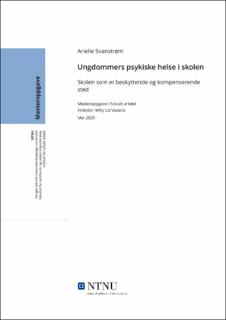Ungdommers psykiske helse i skolen – skolen som et beskyttende og kompenserende sted
Master thesis
Date
2020Metadata
Show full item recordCollections
- Institutt for sosialt arbeid [1367]
Abstract
Sammendrag
Denne masterstudien handler om hvordan miljøpersonalet på ungdomstrinnet i skolen jobber med ivaretakelsen av unges psykiske helse, hvilke tilnærminger de benytter og hvordan de utøver forebyggende arbeid i så måte. Dette kan sees på bakgrunn av den nåtidige økningen i psykiske helseplager hos barn og unge. Et delfokus i studien er hvordan skolene arbeider og forbereder seg til innføringen av det nye tverrfaglige temaet folkehelse og livsmestring.
Det empiriske grunnlaget er to kvalitative fokusgruppeintervju og et dybdeintervju med til sammen syv ansatte ved to ulike skoler.
Teoretiske perspektiver i studien er Antonovskys teori om salutogenese, helsefremmende faktorer og utvikling av mestringsevne. Det kan forbindes med unges robusthet og mestring av psykiske vansker og påkjenninger gjennom et beskyttende og kompenserende skolemiljø. I et slikt perspektiv tilkommer forskningsstøttet kunnskap om risiko- og beskyttelsesfaktorer i og rundt elevene, relatert til forebyggingsarbeid i skolen.
Sentrale funn i studien dreier seg om ulikheter i arbeidsmåter, organisering og ressursbruk i arbeidet med psykisk helse i de to skolene. En av skolene har utformet en plan for elevenes psykiske helse, og vektlegger forebygging og arbeid på gruppenivå. De ansatte har også tatt i bruk sosiale medier for kontakt og samhandling med elevene. Den andre skolen organiserer arbeidet mer mot oppfølging av enkeltelever, noe som reduserer universelt forebyggingsarbeid.
Fellestrekk for skolene er individuelle elevsamtaler, prosjektrettet arbeid, sosiale arrangement og aktiviteter, i tillegg til tverrfaglig samarbeid og foreldresamarbeid. Abstract
This study emphasis how child care workers, social workers and social educators at secondary schools attend to adolescent’s mental health, which approaches they turn to, and how preventive work are practiced. These areas can be highlighted in the present increase of mental health difficulties among children and adolescents. Partially of focus, this study looks at how schools work and prepare themselves for the introduction of the new interdisciplinary subject “Public health and life coping”.
The empirical basis of the study consists of two qualitative focus-group interviews and one in-depth interview, with a total of seven employees from two different schools.
The theoretical framework of this study is based on Antonvskys theory of salutogenesis, health promoting work, and the development of coping skills. These perspectives can be linked to adolescents’ resilience and coping of mental difficulties, as well as the strains they face in a protective and compensating school environment. Such a perspective can provide supported research on risk- and protective factors that surrounds pupils, and this is related to prevention work in school.
Findings from this study encompasses different working methods, organization, and use of resources in the work with mental health at the two different schools. One of the schools has devised a plan on pupil’s mental health, and lay emphasis on prevention and working on a group level. The employees have also used social media as a tool for contact and interaction with the pupils. The other school organizes work more toward follow-up of individual pupils, resulting in a decrease of prevention work.
The similarity between the two schools is individual conversation with pupils, project-oriented work, social events and activities, as well as cooperation both interdisciplinary and with parents.
